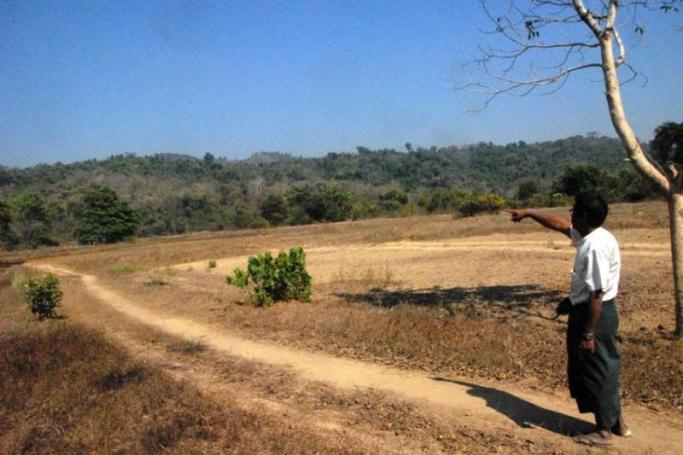For years, a natural buffer of thick forest kept the annual monsoon waters from inundating Sein Win’s Bokalay Kyaungone village, sustaining a way of life even under harsh conditions.
Located in southern Rakhine State’s Kyeintali Township, the village relied on the trees to stop flooding from damaging property, besieging roads, ruining harvests and, in extreme cases, threatening lives.
They also relied on the forest as a source of income and nourishment, finding everything from firewood to mushrooms to honey in its deep woods.
But this natural setup is ending, residents say, because a number of private companies have been granted licenses to clear parcels of land and create their own hardwood plantation sites, a practice that started under the administration of former president Thein Sein and is exempt from Myanmar’s ban on commercial logging for export.
“Many workers and machines were used as part of their work,” Sein Win said, describing a period of production that he says ramped up in 2014, about a year before elections brought Aung San Suu Kyi’s National League for Democracy to power. “The nearby villages experienced inundation for the first time.”
Kyaw San, Sein Win’s neighbor in Bokalay Kyaungone, said the increased water levels made parts of the planting and harvesting cycle impossible.
“Cultivation lands were covered with sediment in the monsoon period, and we cannot plough them,” he said.
According to statistics from Thandwe district’s Forestry Department, a total of 83 acres in Thandwe, 747 acres in nearby Taungup township and 956.5 acres of forest areas Gwa township were allowed for private forest development since 2008.
Myint Aung, a resident of Gwa township’s Tone Taw village, said that in addition to causing decreased rice production, flooding in 2015 sent flotsam, logs and garbage directly into the community.
“A 30-year-old man also died from removing timber logs in the flood,” Myint Aung said.
The problem got so bad that local officials came to inspect the situation after residents lodged complaints.
NOT OUR FAULT
Mighty Marine Product Company, one of the firms granted permission to work in the communities, has a different view. Granted a 500-acre permit to clear and then replant teak, rosewood and other hardwood trees about 20 miles away from Sein Win’s village, the company says it has removed a limited amount of forest – only 30 acres – since it started operations in 2010. Mighty Maring started a plant nursery to fight deforestation, an official said.
“Our company has a plan to spend 20 percent of profits for local development programmes,” a representative told Myanmar Now, speaking on condition of anonymity as he was not authorized to talk to the media. He accused locals of engaging in illegal logging.
Maung Maung Kyi, the founder of the Rakhine Coastal Region Conservation Association, said that companies should invite residents to participate in reforestation projects, creating more communication.
Otherwise the disputes could delay a more productive solution for both sides.
“Discussion on both compensation, reforestation programmes and legal actions must be considered seriously,” he said.
COMMUNITY FOREST
One idea that is showing some early signs of success is the government’s “community forest” plan.
Most of the households in Sein Win’s village depend on the forest for their income as they don’t own land to grow crops.
In early 2014, local authorities set up community forests in which five acres of land were allocated to each household. Some 20 families signed up.
In 2014 and 2015, the projects were implemented in Taungup and Gwa townships on the Rakhine coast near Thandwe. In Thandwe itself, 698 acres were set aside in the 2016-2017 fiscal year, said Aung Hla, a senior clerk at the Thandwe District Forestry Department.
But they may not be enough to reclaim what has already been lost.
“There is no more forest to contain the flood,” Sein Win said.
Courtesy Myanmar Now
You are viewing the old site.
Please update your bookmark to https://eng.mizzima.com.
Mizzima Weekly Magazine Issue...
14 December 2023
New UK Burma sanctions welcome...
13 December 2023
Spring Revolution Daily News f...
13 December 2023
Spring Revolution Daily News f...
12 December 2023
Spring Revolution Daily News f...
11 December 2023
Spring Revolution Daily News f...
08 December 2023
Spring Revolution Daily News f...
07 December 2023
Diaspora journalists increasin...
07 December 2023
Myanmar Suu Kyi supporters blocked from campaigning in Thailand












